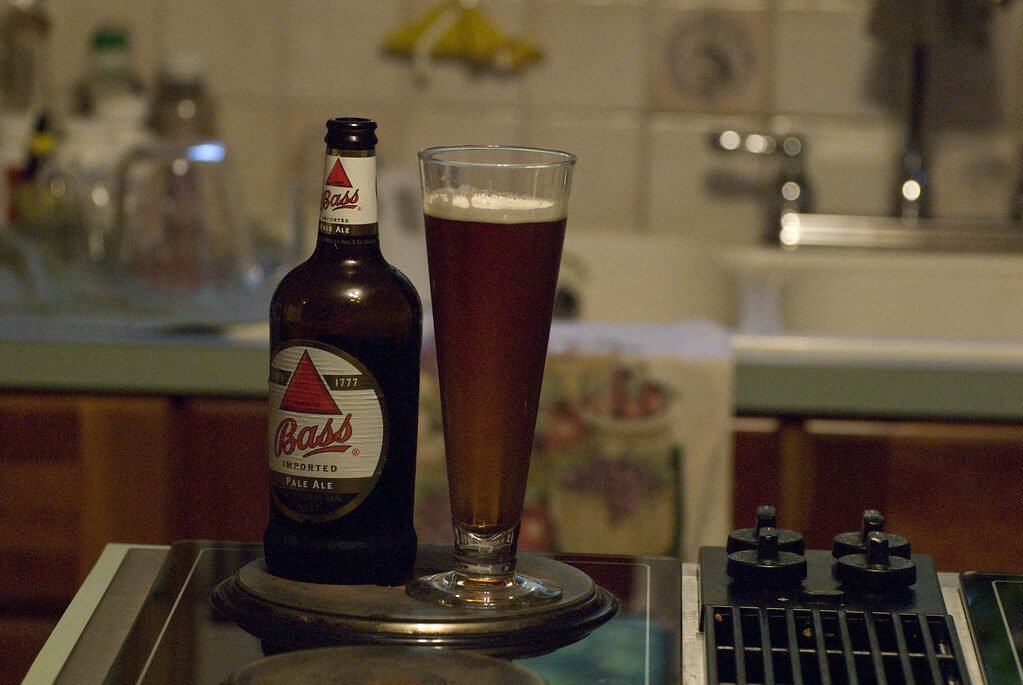There are well-known beer names that have been around for a long time. Many people like Bass Ale beer and have had it for a long time. It saddens us to hear that Bass Ale Discontinued. Many people love this drink, and taking it off the shelves means the end of an era.
Lager fans all over the world love Bass Ale, which makes it very unique for buyers. Bass Ale is well-known for its distinctive taste and prominent logo. This beer is made in a way that is both high-quality and old-fashioned. Fans are afraid because they heard that the product might be taken off the market.
Here, we’ll discuss Bass Ale’s past, why it’s essential to the beer business, and how fans feel about its ban. What made us decide to do this? We will also consider how the beer market is changing. Join us to learn about Bass Ale’s past and its plans.
Table of Contents
History and overview of Bass Ale
Everyone worldwide loves Bass Ale, and it’s been around for a long time. It was started by William Bass in 1777 in Burton upon Trent, England. It became famous for its unique taste and the red triangle used as a logo.
The brewery used Burton well water, which was clean and unique. This made the beer taste good. Bass Ale was one of the first to use yeast. This yeast made the beer smell and taste sweet, which helped it become famous.
As time passed, more and more people worldwide liked Bass Ale and began to award and praise it. In the 1800s, it was the first name to have a trademark. The red triangle proved that it was real and of high quality.
Beer-making aside, Bass Ale significantly changed English bars and the way people worldwide drink beer. It became an even more well-known cultural symbol when it appeared in books, paintings, and everyday life.
Bass Ale has been loved for a long time, and since then it has tasted great. Different people and people’s tastes have changed. But, as we’ll swelter, the news that it will no longer be made means this well-known drink’s end of a long time.
An Announcement of Closing
Many beer lovers were surprised and unsure when they heard that Bass Ale would no longer be available. Bass Ale was popular in stores and bars for a long time, so it was unexpected when it suddenly disappeared.
The decision to stop making Bass Ale was difficult and affected by many factors. One main reason the brewery gave was that people’s tastes for beer are changing, and the beer market is constantly changing, too.
Lately, people have been choosing lighter beers with new flavors that are easier to drink. This trend has made it harder for traditional English ales like Bass Ale to compete, decreasing sales.
Also, changes in ownership and corporate restructuring influenced the decision to stop selling Bass Ale. The brewery that used to make this famous beer may have changed in ways that no longer match the brand and beliefs.
When we decided, we considered how much it would cost to make something and whether we would make money from it. Many people who love Bass Ale might feel sad to hear that it’s been discontinued. But it’s important to know why the company made this decision. Breweries must change with the market and what people like to stay in business for a long time.
In the following parts, we will examine the reasons for Bass Ale’s demise and consider what it means for people who drink it and the companies that make beer. Even though they don’t mind anymore, people who love beer will never forget and cherish Bass Ale.
Factors for Discontinuation
Several key factors have led to the decision to stop producing Bass Ale, reflecting the complexities of today:
Consumer Demands Are Changing:
Bass Ale’s decline was primarily due to changing buyer tastes. Ales and IPAs are becoming more popular for more types because they are lighter and have more flavor. Today’s drinkers might not like Bass Ale’s rAle’s malty taste, which would mean lower sales and less demand.
Competition from small breweries:
Traditional beer brands like Bass Ale are finding it challenging to remain competitive in the face of modern artisan breweries. Craft breweries create various delicious, unique beers to satisfy customers’ tastes by focusing on fresh concepts and inventiveness. It’s becoming more work for household names like Bass Ale to stand out and remain relevant in an increasingly crowded market.
Economic Factors:
From a business point of view, stopping the production of bass ale might be affected by economic issues. Many resources and investments are needed to make a beer like Bass Ale. These include finding high-quality ingredients, keeping production sites in good shape, and marketing the beer. There is a plan to cut costs and improve operations by pausing production.
Changing ownership and the company:
Changes in ownership and business strategy can also affect Bass Ale’s future. For example, suppose the brewery that makes Bass Ale undergoes a reorganization or shifts its attention to other goods or markets. In that case, it might put less effort into creating and marketing Bass Ale. Business choices like brewery and acquisitions can significantly affect a brewery’s brand sales.
Overall, the choice to stop making Bass Ale was made because of changing consumer tastes, more competition from craft breweries, economic factors, and changes in ownership and corporate strategy. By understanding these factors, you can see how the decision will affect consumers and the beer business.
Consumer and Fan Reaction
The news that Bass Ale Discontinued has saddened its loyal customers and fans. Many people have fond memories of drinking Bass Ale with loved ones, which makes them feel nostalgic. People feel unhappy and disappointed because they can’t find Bass Ale in stores or bars. They see it as more than just a drink—it represents tradition and the history of English brewing.
People on social media and online forums have strong feelings and are passionate about talking about the end of Bass Ale. Fans have talked about how much they love Bass Ale and shared stories about its importance. While feeling sentimental, it’s also recognized that the beer industry is changing. Traditional beers like Bass Ale compete with new and different kinds of beer.
After hearing the news, some people are buying extra supplies or looking for similar alternatives that taste like Bass Ale. Some people hope the brand will return or become popular again so future generations can enjoy its history. The response shows how much people care when a well-known brand stops being available and how critical famous beers like Bass Ale are to beer fans everywhere.
Brewing Industry Impact
TBass Ale Discontinued is a significant change for the beer industry. It’s not just about what people like to drink; it affects all traditional English ales. Famous for its tasty flavor and essential history, Bass Ale has been a symbol of good quality and skill for many beer fans. Now that Bass Ale is no longer available, there is a gap in the beer community. This makes the industry work hard to create new rules for good quality and traditional taste.
Apart from its influence on culture, Bass Ale’s departure also shows that other brands and breweries might be affected, too. As people start to like lighter and different kinds of beers, old-fashioned English ales must change, or they might disappear. This change shows that small craft breweries are becoming more popular, so big breweries have to develop new ideas to stay competitive.
When people stopped drinking Bass Ale in the past, it showed how our tastes and traditions changed over time. Although the beer is no longer made, people still remember and love it. Its influence continues to impact the brewing industry. The stopping of Bass Ale is not only the end of a period but also the start of a new era where new ideas and changes will shape the future of beer-making.
Alternatives for Bass Ale Fans
For fans of Bass Ale disheartened by hearing that Bass Ale Discontinued, here are some accessible alternatives that offer similar flavor profiles and qualities. While nothing can truly replace the beloved taste of Bass Ale, exploring these options can ease the transition and help discover new favorites within the realm of English beers.
1. Fuller’s London Pride: Much is said and wriFuller’sut Fuller’s London Pride, a classic English beFuller’sa mild malt taste, low-key hop presence, and a clean aftertaste. Brewed in the mother city of London, it promises a great drinking experience similar to Bass Ale.
2. Samuel Smith’s Old Brewery Bitter: Samuel Smith’s Smith’ Swery Bitter is another excellent substitute for Bass Ale. Produced by one of the oldest independent brewers in Great Britain, this beer has a reddish-brown color, biscuit malt taste, and soft bitterness that lovers of traditional English beer will welcome.
3. Timothy Taylor’s Landlord: The Landlord is one of Taylor’s pale ales. It belongs to the Timothy Taylor Brewery in Yorkshire, England. As a golden beer with floral hop character and a clean bitter finish, Landlord can help CAMRA drinkers turn their backs on Bass and appreciate its purity.
4. Theakston Old Peculier: Unlike Bass Ale, Theakston Old Peculier is preferred by those who want a rich and strong drink. This dark, heavy beer contains a roasted malt taste with hints of dried fruits and caramel that English Ale aficionados will surely appreciate.
5. Adnams Southwold Bitter: Another beer that bassline fans will like is Adnams Southwold Bitter. Adnams Brewery produces this traditional English beer in Southwold, Suffolk. It is a tasty copper-tasting drink with a biscuit malt base and a hint of hop bitterness, making it easy to recommend.
6. Marston’s Pedigree: Marston’s Pedigree is a beer Marston has produced for 180 years. It uses Maris Otter barley and Fuggles and Golding hops. Pedigree has a malty, sweet taste accentuated by caramel and toffee undertones, making it recognizable to Bass Ale drinkers.
Speculation On The Future
The fact that Bass Ale was Discontinued worries the future of old-fashioned English beers and the brewing industry. Losing a famous brand might mean that traditional types of beer are less popular now. But there are also reasons to feel hopeful.
One way to make beers like Bass Ale popular again is by tapping into the increasing interest in traditional and small-scale brewing. As more people look for natural drinks, breweries that make English beers may have a chance to sell more in this growing market.
In addition, the expansion of small breweries has made brewing beer available to more people, leading to a wider variety of beer styles and flavors being tried. Even though Bass Ale is no longer available, there is still plenty of room for English beers to grow and be creative.
Breweries that can change but still make delicious beer the old-fashioned way appeal to modern beer drinkers. Improvements in brewing technology and sustainable practices make it easier to make and sell traditional beers. Breweries can also make beer while being kind to the environment, using eco-friendly methods and packaging to lower their impact on the earth.
Conclusion: Bass Ale Discontinued
The ending of Bass Ale means the end of a time in beer history. Bass Ale has been around since 1777 and is famous for its exceptional taste from Burton well water and unique yeast. It represents the very best of traditional English brewing.
Its decline shows that people are starting to like more unique and lighter beers, and there are also changes in the industry due to the economy and companies. While feeling sad about losing it, fans have shared happy memories and talked about how vital Bass Ale is to culture.
In the future, this beer will continue to inspire new brewers, even though it’s no longer being made. It will always be an essential part of brewing history.
FAQs- Bass Ale Discontinued
Why Is There No Bass Ale?
The Bass company decided to focus on hospitality rather than brewing, and in June 2000, Bass’s brewing business was sold to the BelBass’srewer Interbrew (later Anheuser-Busch InBev).
What Is Equivalent To Bass Ale?
This brew is light pale and has a nice dry finish, which makes it easy to drink. It is comparable to Bass Ale.
How Strong Is Bass Ale?
Bass is a full-flavored English-style ale still brewed according to its original recipe. Bass is brewed with two strains of traditional ale yeast to produce a complex, nutty, malty taste with subtle hop undertones and a beautiful chestnut hue. Bass is 5.1 percent alcohol by volume (ABV).
Who Owns Bass Ale?
Bass’s pale ale is a type of ale owned by Bass’s brewing company, Anheuser-Busch InBev’s Salisbury Brewery. The beer iInBev’s Bass is a full-body ale found by William Bass in 1777 in Burton Upon Trent, England.
Have a look at our other guides!
XXTRA HOT Cheetos Discontinued
Is Intermix Going Out Of Business?
McDonald’s Coffee Stirrer Discontinued







